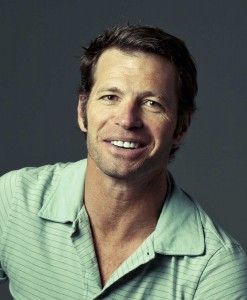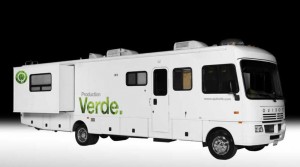
Companies in all aspects of production are expected to participate, including suppliers of production vehicles, catering, set lighting, equipment rental, film and photography studios, location services, set construction and technology.
Visitors will also be able to check out Quixote’s new eco-friendly production motor home line – the Production Verdes. These new production vehicles rely on solar panels and state-of-the-art battery banks, with a biodiesel generator as backup.
Below the Line recently spoke with Quixote Studios’ CEO Mikel Elliott about some of the challenges of greening Hollywood.
Below the Line: What is the current state of the production business as it relates to green? Is the industry still evolving and if so in what ways?
Mikel Elliott: We believe Quixote is now at the forefront of greening productions, in our use of recycled materials, eco-friendly operating practices, and our “Verde” motorhomes. We’ve seen and continue to participate in the groundswell of eco-improvements, but there’s still a lot of work to be done in the industry.
Many budgets today are so tight that it’s difficult for production companies to pursue all available options for environmental sustainability on their own because there are often hard costs associated with pursuing these initiatives. A few advertisers are now starting to require some level of compliance and are therefore allowing their production companies to budget for it. Consulting companies are popping up. But to be most effective, we think green initiatives ultimately need to be driven by the end-client, because budgets are just getting tighter and tighter.
In film production, every aspect of the filmmaking process is becoming miniaturized and digitized – the push is to ever smaller “stuff,” which leads to a reduced carbon output. We’re seeing fewer vehicles and fewer big pieces on set. Our Production Verde motorhomes were built from the start to be environmentally friendly. Consolidating vehicles is another positive way to achieve some green benefits, so there’s a distinct push for “tandem production trailers,” another Quixote innovation.

Elliott: The move to digital film is having a profoundly positive impact in reducing carbon waste, and innovative technology companies have come to the fore and eliminated a lot of the need for shipping physical media around the country.
As digital cameras have become smaller and more capable in lower light conditions, productions require less lighting – and less power – than they ever have before. Plus, the traditional set is changing and being built and used in more eco-friendly ways. When you look at the modern-day set, it’s more and more about the greenscreen, where people are now dropping in digital backgrounds in postproduction. Additionally, the inventory of very realistic looking digital sets is growing, so filmmakers don’t have to shoot on the streets of Manhattan to get that skyline or build that particular set.
We’re teaming up with other leaders in our industry to showcase some of these green innovations at our upcoming EcoFair event in LA this Friday, June 15.
BTL: Tell us more about the EcoFair and the background of the event.
Elliott: The Quixote EcoFair will be held at our West Hollywood location. It’s a free six-hour celebration that highlights the growing movement towards sustainability in entertainment and media production. Companies in many aspects of production are expected to participate, including suppliers of production vehicles, set lighting, equipment rental, film and photography studios, location services, set construction and technology.
We will be showcasing the latest eco-conscious trends from a wide range of companies and the event will include a panel discussion among green industry luminaries. During the panel – “How Green is My Production?” – presenters will discuss environmental practices with a focus on moving towards production that’s off-the-grid, zero waste, no impact and carbon neutral. It should be informative and we’re looking forward to the conversation!
BTL: Are there particular challenges when greening production stages and if so what are the proposed green solutions?
Elliott: Power use is a challenge. Recycling sets is still very difficult. Reducing waste is an overarching challenge. There’s just so much waste!
But individuals are becoming more conscious. I think there are some grips and electricians who will try to reuse gels and stuff, but time is always an issue. Companies do exist now that help to repurpose materials from set construction. There are recycling services that compost and recycle. Caterers are starting to use compostable materials for plates, cups, flatware, etc. Many location service companies are using reusable mats instead of cardboard. Innovators in the lighting business are developing more energy-efficient lamps.
Also everyone is getting away from plastics and many productions have banned water bottles. Quixote’s rentals of coolers and reusable water bottles – the big five-gallon ones – have gone through the roof. We bring in the water dispensers and discourage the practice of providing huge cases of plastic water bottles on set.
BTL: Quixote Studios recently introduced the NY and LA Production Verdes. Can you tell us more about the appeal of those vehicles?
Elliott: Quixote is known for its green fleet. The appeal of the new Production Verdes across the board is that everyone appreciates the smart design, the ergonomics and the superior functionality. We’ve long been a leader in “going green,” and the NY and LA Production Verdes are no exception. From hood to tailpipe, exterior to interior, each motorhome is built with sustainable, green materials including formaldehyde-free plywood, LED lighting, recycled materials and low VOC paint throughout. Additional highlights such as eco-poly fabric, natural foam couch cushions and bamboo curtains are made from materials that dramatically reduce the transmission of airborne toxins.
The LA Production Verde is equipped with solar panels and the same innovative air conditioners used to cool the latest generation of bullet trains. It’s solar panels and state-of-the-art battery banks allow it to operate all day without running the generator. The generator will automatically kick in as a backup should the engine require additional power – for example, on night shoots or on overcast days.
Prior to the debut of Quixote’s production motorhomes, we unveiled the biodiesel-fueled Talent Verdes. The Talent Verdes were the first industry motorhomes to be eco-conscious and also satisfy the discerning needs of celebrities. Due to the increasing demand for sustainable options in production, we’ve now retrofitted all of our diesel engines to run on biodiesel.
Many of our clients are initially drawn to the vehicles because of the sustainable materials and reduced carbon impact, but flawless functionality is also crucial. Our motorhome interiors and layouts were designed by production professionals intimately familiar with the unique needs of a busy production team.
BTL: Beyond the Production Verdes, in what other ways has Quixote embraced the green production movement? What’s in Quixote’s future in this area?
Elliott: Living in LA, everyone is a big consumer of everything, especially energy. I think our overarching goal is about galvanizing and participating in the community. At Quixote we talk the talk, but we also walk the walk, and that means being part of the community’s efforts to be more green. If you think about what you can do to make your community greener, and then go out and do it, that’s a monumental contribution.
At Quixote we have a clean team effort. We go into the neighborhood on a monthly basis and clean it up. It’s a very low-tech green initiative; we literally go out with little pinchers and pick up the garbage. Getting outside and cleaning things up a bit, being a little more aggressive with our recycling efforts may be a small step, but it’s significant – especially if everyone gets involved this way.
BTL: We understand you are currently in the planning stages for a major renovation of your Smashbox Studios location in Culver City, CA. Is there a green element in that?
Elliott: We do have a big multimillion-dollar remodel happening at Smashbox Studios Culver City, which will be complete by Spring 2013. When possible, every aspect of the renovation will take advantage of LEED certified construction, recycled materials, solar technology and efficient power systems.
BTL: What are Quixote’s plans for New York and what’s your view of the state as it relates to green production practices?
Elliott: The green movement in New York is growing. There has been a steady drumbeat in the last few years from our New York clients saying, “Oh you’ve got to bring your green vehicles to New York.” Since the launch of the Talent Verde in New York, our clients there have been enthusiastically supportive. That’s been overwhelmingly motivating for us.
We are going to explore how sustainable technologies can be further utilized for productions in New York. And we will continue to push our proprietary solar technologies, and the use of recycled materials and biofuel in innovative ways, as we operate in New York circles and beyond.
For more information about Quixote’s EcoFair, visit http://www.quixote.com/ecofair/





